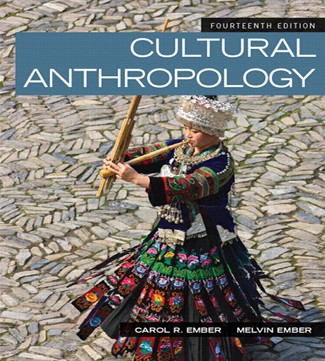Cultural Anthropology 14th Edition Ember Ember Peregrine Test Bank
$35.00
Cultural Anthropology 14th Edition Ember Ember Peregrine Test Bank
978-0134114170
CHAPTER 3: Culture and the Individual
Multiple Choice Questions
1. Which early-20th-century anthropologist studied Samoan adolescents, calling into question the assumption that adolescent psychological development was similar everywhere?
A) Margaret Mead
B) Bronislaw Malinowski
C) Claude Levi-Strauss
D) Louis Leakey
Question Title: TB_03_01_The Universality of Psychological Development_Remember_3.1
Answer: A
Learning Objective: 3.1 Describe universals in human psychological development.
Topic: The Universality of Psychological Development
Skill Level: Remember the Facts
Difficulty Level: 2-Moderate
2. What is Piaget’s first stage of development?
A) sensorimotor
B) formal operational
C) concrete operational
D) sensorioperational
Question Title: TB_03_02_The Universality of Psychological Development_Remember_3.1
Answer: A
Learning Objective: 3.1 Describe universals in human psychological development.
Topic: The Universality of Psychological Development
Skill Level: Remember the Facts
Difficulty Level: 1-Easy
3. Which anthropological term may be used in place of socialization?
A) enculturation
B) assimilation
C) diffusion
D) education
Question Title: TB_03_03_The Anthropology of Childhood_Remember_3.2
Answer: A
Learning Objective: 3.2 Discuss anthropological findings regarding childhood.
Topic: The Anthropology of Childhood
Skill Level: Remember the Facts
Difficulty Level: 1-Easy
4. Culturally patterned ideas about what kind of children parents want to raise and how they should treat their children are called __________.
A) ethnotheories
B) hypotheses
C) ideologies
D) philosophies
Question Title: TB_03_04_The Anthropology of Childhood_Remember_3.2
Answer: A
Learning Objective: 3.2 Discuss anthropological findings regarding childhood.
Topic: The Anthropology of Childhood
Skill Level: Remember the Facts
Difficulty Level: 1-Easy
5. Which societies tend to show more warmth and affection toward their children?
A) foraging
B) pastoral
C) horticultural
D) market economies
Question Title: TB_03_05_Cross-Cultural Variation in Childrearing_Remember_3.3
Answer: A
Learning Objective: 3.3 Describe cross-cultural variations in childrearing and their implications for behavior and psychological development.
Topic: Cross-Cultural Variation in Childrearing
Skill Level: Remember the Facts
Difficulty Level: 1-Easy
6. What does Beatrice Whiting describe as one of the most powerful socializing influences on children?
A) their setting and the people within it
B) television, movies, and the Internet
C) diet, health, and activity levels
D) family structure and history
Question Title: TB_03_6_Cross-Cultural Variation in Childrearing_Remember_3.3
Answer: A
Learning Objective: 3.3 Describe cross-cultural variations in childrearing and their implications for behavior and psychological development.
Topic: Cross-Cultural Variation in Childrearing
Skill Level: Remember the Facts
Difficulty Level: 2-Moderate
7. Cross-cultural studies have shown that both cognitive abilities among children and their ability to think abstractly are influenced by how much __________ they receive.
A) schooling
B) breast milk
C) nurturing
D) protein
Question Title: TB_03_07_Cross-Cultural Variation in Childrearing_Remember_3.3
Answer: A
Learning Objective: 3.3 Describe cross-cultural variations in childrearing and their implications for behavior and psychological development.
Topic: Cross-Cultural Variation in Childrearing
Skill Level: Remember the Facts
Difficulty Level: 1-Easy
8. The Japanese concept of self is often described as __________.
A) relational
B) individualistic
C) neighborly
D) egocentric
Question Title: TB_03_08_Psychological Variation in Adulthood_Remember_3.4
Answer: A
Learning Objective: 3.4 Explain psychological variability in adults.
Topic: Psychological Variation in Adulthood
Skill Level: Remember the Facts
Difficulty Level: 2-Moderate
9. The traditional Inuit concept of inummarik, or “a genuine person,” includes a lifelong process of __________.
A) ecological involvement
B) family commitment
C) educational achievement
D) financial security
Question Title: TB_03_09_Psychological Variation in Adulthood_Remember_3.4
Answer: A
Learning Objective: 3.4 Explain psychological variability in adults.
Topic: Psychological Variation in Adulthood
Skill Level: Remember the Facts
Difficulty Level: 2-Moderate
10. The idea that an understanding of personality might help us explain connections between primary and secondary institutions is called __________.
A) personality integration of culture
B) personality and social integration
C) personal-cultural synchrony
D) personal-social connection
Question Title: TB_03_10_Psychological Explanations of Cultural Variation_Remember_3.5
Answer: A
Learning Objective: 3.5 Discuss psychological explanations of cultural variation.
Topic: Psychological Explanations of Cultural Variation
Skill Level: Remember the Facts
Difficulty Level: 2-Moderate
11. In projective tests, subjects are given stimuli that are purposely __________.
A) ambiguous
B) incorrect
C) impossible
D) humorous
Question Title: TB_03_11_Psychological Explanations of Cultural Variation_Remember_3.5
Answer: A
Learning Objective: 3.5 Discuss psychological explanations of cultural variation.
Topic: Psychological Explanations of Cultural Variation
Skill Level: Remember the Facts
Difficulty Level: 1-Easy
12. Ethnographers are focusing more explicitly now on the importance of the individual in bringing about change. This is called individual __________.
A) agency
B) variation
C) socialization
D) independence
Question Title: TB_03_12_Individuals as Agents of Cultural Change_Remember_3.6
Answer: A
Learning Objective: 3.6 Discuss and give examples of individuals as agents of social change.
Topic: Individuals as Agents of Cultural Change
Skill Level: Remember the Facts
Difficulty Level: 1-Easy
13. Why did 20th-century anthropologists become interested in psychology?
A) They did not believe that human nature was completely revealed in Western societies.
B) Psychology was just becoming popular as an academic discipline.
C) Greater contact with other cultures was showing a surprising variety of psychological patterns.
D) They were trying to distance themselves from sociologists by focusing more on the individual.
Question Title: TB_03_13_The Universality of Psychological Development_Understand_3.1
Answer: A
Learning Objective: 3.1 Describe universals in human psychological development.
Topic: The Universality of Psychological Development
Skill Level: Understand the Concepts
Difficulty Level: 2-Moderate
14. Why do anthropologists question results given by cross-cultural psychologists that indicate psychological development is delayed in many non-Western societies?
A) The tests used are developed in the West using testing materials often unfamiliar to other cultures.
B) Cross-cultural psychology is basically flawed in its ability to measure differences.
C) Concepts such as conservation and formal operational thinking are not known in other cultures.
D) Cross-cultural psychology is a new, and therefore untested, field.
Question Title: TB_03_14_The Universality of Psychological Development_Understand_3.1
Answer: A
Learning Objective: 3.1 Describe universals in human psychological development.
Topic: The Universality of Psychological Development
Skill Level: Understand the Concepts
Difficulty Level: 3-Difficult
15. In his research on psychological development in the Tiv, Douglass Price-Williams found that __________.
A) there was no difference between Tiv and European children in understanding of conservation of earth, nuts, and numbers
B) even with natively familiar test materials, Tiv children never reached an understanding of conservation to match the European children
C) the Tiv children had a stronger understanding of conservation than European children when tested with earth, nuts, and numbers
D) the Tiv children reached an understanding of conservation at an earlier age than European children, regardless of the testing method
Question Title: TB_03_15_The Universality of Psychological Development_Understand_3.1
Answer: A
Learning Objective: 3.1 Describe universals in human psychological development.
Topic: The Universality of Psychological Development
Skill Level: Understand the Concepts
Difficulty Level: 2-Moderate
16. Humans are unusual among mammals in our __________.
A) long post-reproductive life span for females
B) close connections between mothers and their infants
C) high lifetime reproductive rates in males
D) tendency to live in social groups of unrelated adults
Question Title: TB_03_16_The Anthropology of Childhood_Understand_3.2
Answer: A
Learning Objective: 3.2 Discuss anthropological findings regarding childhood.
Topic: The Anthropology of Childhood
Skill Level: Understand the Concepts
Difficulty Level: 2-Moderate
17. What did a study of single mothers in California find about the consistency of parenting conventions?
A) So-called “unconventional” parents did not differ that much from the more “conventional” ones.
B) Single mothers were more likely to see themselves as “unconventional” parents.
C) Single mothers were more likely to follow traditional childrearing methods.
D) “Unconventional” parents used methods that were very divergent from the general cultural pattern.
Question Title: TB_03_17_The Anthropology of Childhood_Understand_3.2
Answer: A
Learning Objective: 3.2 Discuss anthropological findings regarding childhood.












Reviews
There are no reviews yet.